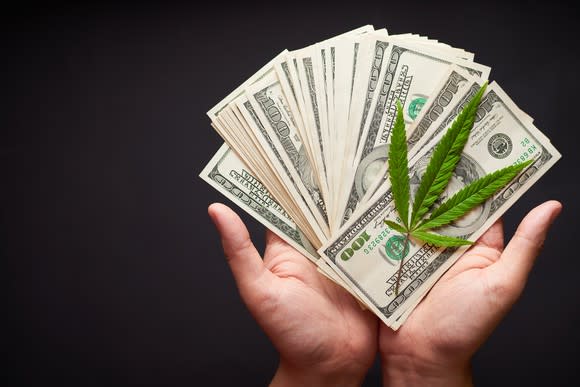Why Canadian Marijuana Growers Could Enter the U.S. Sooner Than You Think
It's no secret that Canopy Growth (NYSE: CGC) and other Canadian marijuana growers would love to expand into the huge U.S. market. But marijuana remains illegal at the federal level in the U.S. As long as this remains the case, Canopy and its peers won't be able to directly enter the U.S.
A bill that's being sponsored by Sen. Cory Gardner (R-Colo.) and Sen. Elizabeth Warren (D-Mass.) would, if passed, result in the U.S. government recognizing and upholding state laws that allow legalized cannabis. But there's a long way to go for this proposed legislation.
However, another bill under consideration by the U.S. Congress includes language that would legalize certain types of cannabis. Because many states would benefit from passage of this legislation, the chances of it ultimately passing are relatively good. And it could mean that Canopy Growth and other Canadian cannabis producers could enter the U.S. market sooner than you might think.

Image source: Getty Images.
The 0.3% solution
Technically, cannabis has been legal at the federal level in the U.S. for several years -- at least some cannabis. The Agricultural Act of 2014, frequently referred to as the 2014 Farm Bill, contained language that recognized the legal use of industrial hemp in states that allowed cultivation of the plant.
So what's the difference between marijuana and industrial hemp? The level of tetrahydrocannabinol (THC), which is the primary psychoactive ingredient in cannabis. Industrial hemp was defined as a cannabis sativa plant or part of the plant with no more than 0.3% concentration of THC on a dry-weight basis. Higher than 0.3% THC and you have marijuana. Up to that level, though, it's officially industrial hemp.
A significant drawback with the 2014 Farm Bill, though, was that it required any hemp to be grown as part of a pilot program "for purposes of research." At least 19 states participated in federally sanctioned pilot programs for industrial hemp. Forty-one states have legalized industrial hemp. But businesses wanting to profit from hemp still operated in a gray area because of the wording of the 2014 legislation.
The biggest problem now with the 2014 Farm Bill is that it expired on Sept. 30, 2018. Until the U.S. Congress enacts new legislation, industrial hemp is as illegal as any other form of cannabis at the federal level. But that's where a new bill -- the Agricultural Improvement Act of 2018 (also known as the 2018 Farm Bill) -- comes into play.
This new bill would truly legalize hemp as an agricultural crop. States and Indian tribes would be required to submit a plan for monitoring and regulating hemp production to the U.S. Department of Agriculture. But beyond that, states and Indian tribes would have primary regulatory authority over hemp production that is recognized at the federal level.
Enter, Canopy?
Canopy Growth CEO Bruce Linton made an intriguing statement in his company's Q1 earnings conference call. Linton said that, while Canopy remained committed to only selling cannabis products where it's legal at the federal level, there could be "mechanisms of action" the company could take to enter the U.S. market.
That cryptic comment came right on the heels of the big announcement that Constellation Brands was investing $4 billion in Canopy Growth. Canopy was -- and still is -- flush with cash and ready to spend some of it. So what did Linton mean?
One possibility is that Canopy Growth might buy a U.S. cannabis-focused biotech. I speculated a few days after the Q1 call that Insys Therapeutics might be an intriguing candidate if Canopy went that route. However, passage of the 2018 Farm Bill could open up an even bigger way for Canopy to enter the U.S. market.
Hemp production would be a natural fit for Canopy. Constellation and Canopy have talked about launching a wide variety of cannabis-infused beverages in Canada. But if the 2018 Farm Bill becomes the law of the land, the two partners might also be able to legally launch beverages containing cannabidiol (CBD) made from hemp in the much-bigger U.S. market.
And Canopy Growth wouldn't have to worry about being delisted on the Toronto Stock Exchange (TSX). The company would still be able to adhere to the TSX's listing requirements and its own commitment to only market cannabis products where they're federally legal.
Political wrangling
So will the 2018 Farm Bill become law anytime soon? Maybe.
The problem is that the U.S. House of Representatives and the U.S. Senate passed bills containing different language. The conference committee from the two legislative chambers can't agree on how to resolve some key differences on proposed food stamp program changes.
Meanwhile, the clock is ticking. A new Congress will be sworn in on Jan. 3, 2019. It's possible that the November elections in the U.S. could help influence members to meet in the middle to get the legislation passed. If not, the process will have to start all over again next year.
Either way, Canopy Growth and other big Canadian marijuana growers just might head south a lot sooner than some think they will.
More From The Motley Fool
Keith Speights has no position in any of the stocks mentioned. The Motley Fool has no position in any of the stocks mentioned. The Motley Fool has a disclosure policy.
